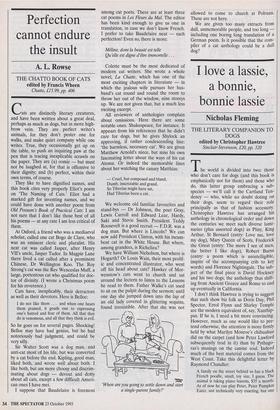Perfection cannot endure the insult
A. L. Rowse
THE CHATTO BOOK OF CATS edited by Francis Wheen Chatto, f15.99, pp. 406 Cats are distinctly literary creatures, and have been written about a great deal, perhaps as much as dogs, but in more high- brow vein. They are perfect writer's animals, for they don't pester one for walks, and make quiet company while one writes. True, they occasionally get up on the table, to push an inquiring paw at the pen that is tracing inexplicable scrawls on the paper. They are (a) comic — but must not be laughed at, for that is offensive to their dignity; and (b) perfect, within their own terms, of course.
They like to have dignified names, and this book cites very properly Eliot's poem on 'The Naming of Cats.' Eliot had a marked gift for inventing names, and we could have done with another poem from Old Possum's Book of Practical Cats: I am not sure that I don't like those best of all his poems — at any rate I am less critical of them.
At Oxford, a friend who was a mediaeval scholar, called one cat Bogo de Clare, who was an eminent cleric and pluralist. His next cat was called Jasper, after Henry VII's uncle, Jasper Tudor. In Magpie Lane there lived a cat called after a prominent Chinese, Dr Wellington Koo. The Roy Strong's cat was the Rev Wenceslas Muff, a large, portentous cat who qualified for doc- tor of divinity. (I wrote a Christmas poem for his reverence.) Cats have, inexplicably, their detractors as well as their devotees. Here is Belloc:
I do not like them ... and when one hears them praised, it goads one to expressing one's hatred and fear of them. All that they do is venomous, and all that they think is evil.
So he goes on for several pages. Shocking! Belloc may have had genius, but he had notoriously bad judgment, and could be very silly.
Sir Walter Scott was a dog man, and anti-cat most of his life, but was converted by a cat before the end. Kipling, good man, liked both, and wrote well about both. I like both, but am more choosy and discrim- inating about dogs — devout and dotty about all cats, except a few difficult Ameri- can ones I have met.
I suppose that Baudelaire is foremost among cat poets. There are at least three cat poems in Les Fleurs du Mal. The editor has been kind enough to give us one in translation, in case we don't know French. I prefer to take Baudelaire neat — such perfection! Even so, there is more: Meline, dont la beaute est telle Qu'elk est digne d'être immortelle .
Colette must be the most dedicated of modern cat writers. She wrote a whole novel, La Chatte, which has one of the most exciting chapters in literature — in which the jealous wife pursues her hus- band's cat round and round the room to throw her out of the window, nine storeys up. We are not given that, but a much less exciting excerpt.
All reviewers of anthologies complain about omissions. Here there are some notable ones. Shakespeare, for instance. It appears from his references that he didn't care for dogs, but he gives Shylock an approving, if rather condescending line: 'the harmless, necessary cat'. We are given Matthew Arnold's niece, but miss his own fascinating letter about the ways of his cat Atossa. Or indeed the memorable lines about her watching the canary Matthias:
— Cruel, but composed and bland, Dumb, inscrutable and grand, So Tiberius might have sat, Had Tiberius been a cat.
We welcome old familiar favourites and stand-bys — Dr Johnson, the poet Gray, Lewis Carroll and Edward Lear, Hardy, Said and Stevie Smith. President Teddy Roosevelt is a good recruit — F.D.R. was a dog man. But where is Lincoln? We can now add President Clinton, with his incum- bent cat in the White House. But where, among grandees, is Richelieu?
We have William Nicholson, but where is Hogarth? Or Louis Wain, their most prolif- ic and concentrated illustrator, who went off his head about cats? Hawker of Mor- wenstow's cats went to church and sat around the lectern to listen to the Lessons he read to them. Father Walke's cat used to sit on the pulpit during the sermon; until one day she jumped down into the lap of an old lady covered in glittering sequins, found irresistible. After that she was not 'When are you going to settle down and start a single-parent family?' allowed to come to church at Polruan. These are not here.
We are given too many extracts from dull, unmemorable people, and too long including one boring long translation of a German poem. Is it possible that the com- piler of a cat anthology could be a dull dog?


































































 Previous page
Previous page